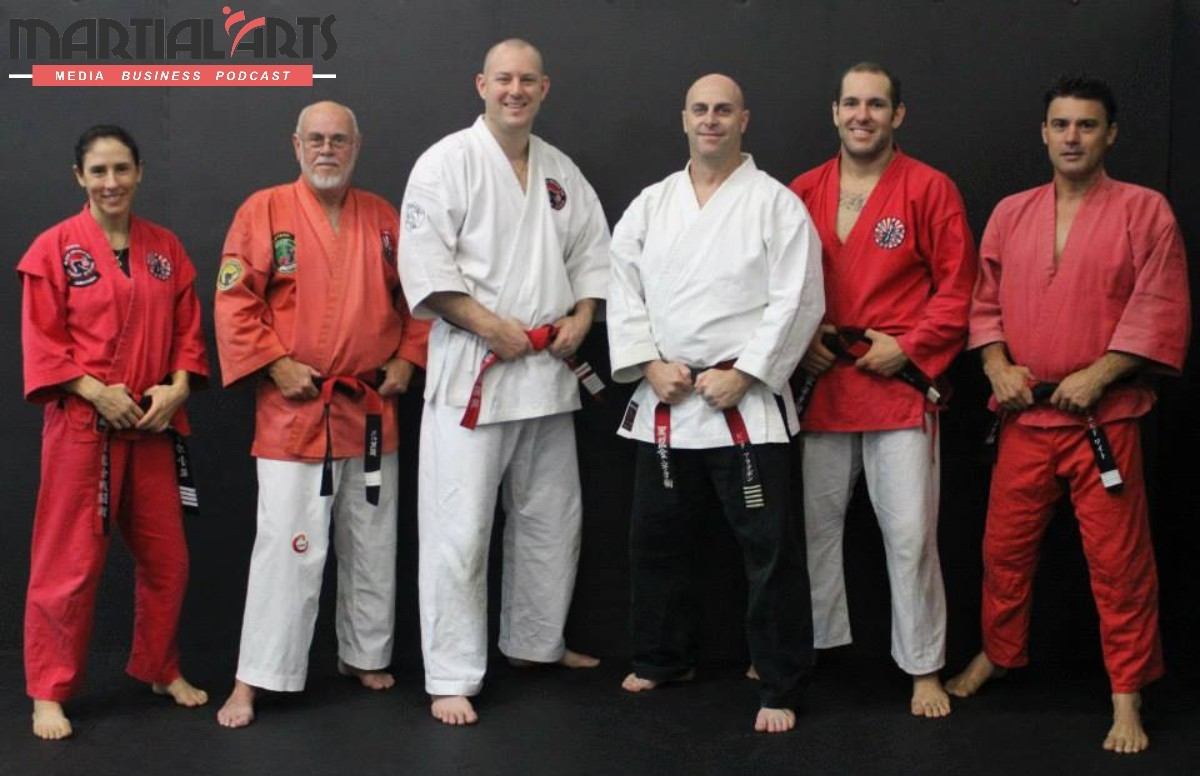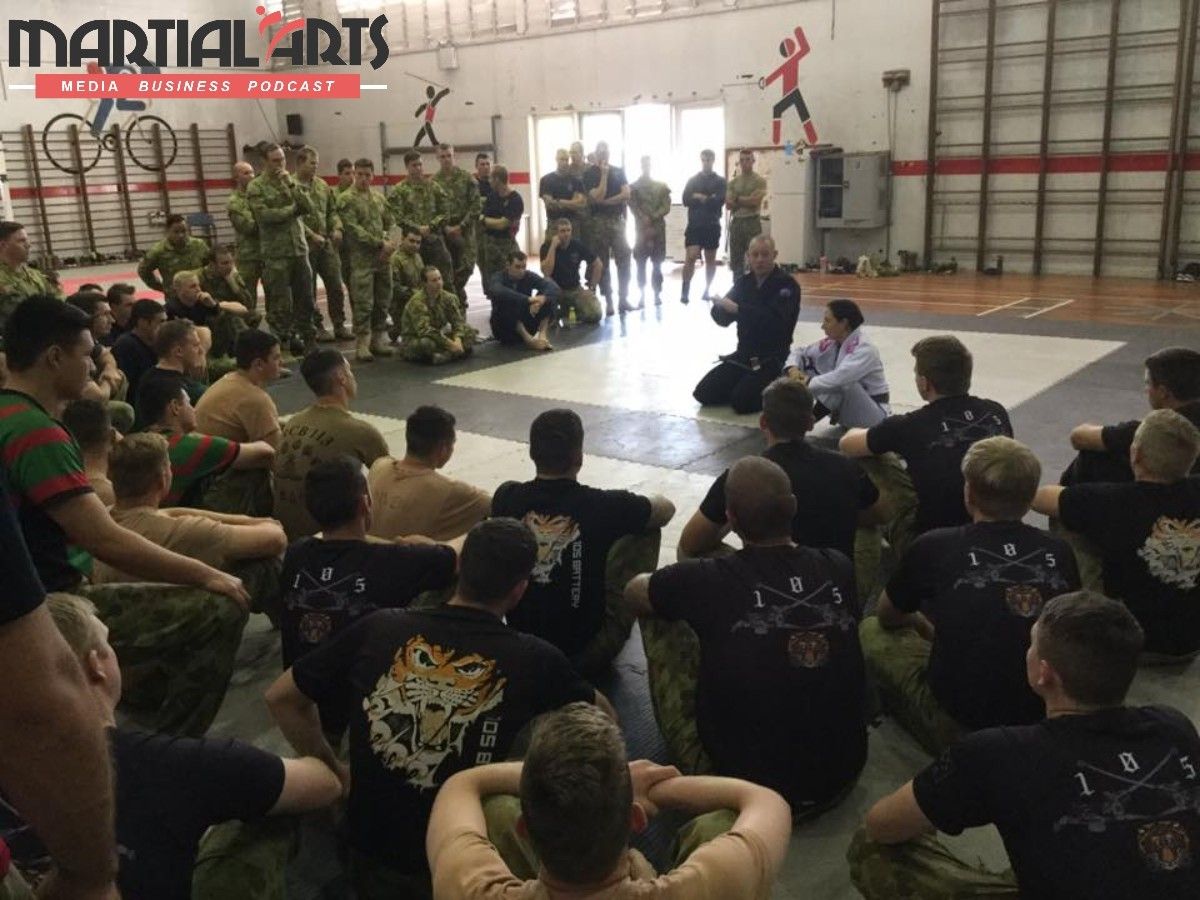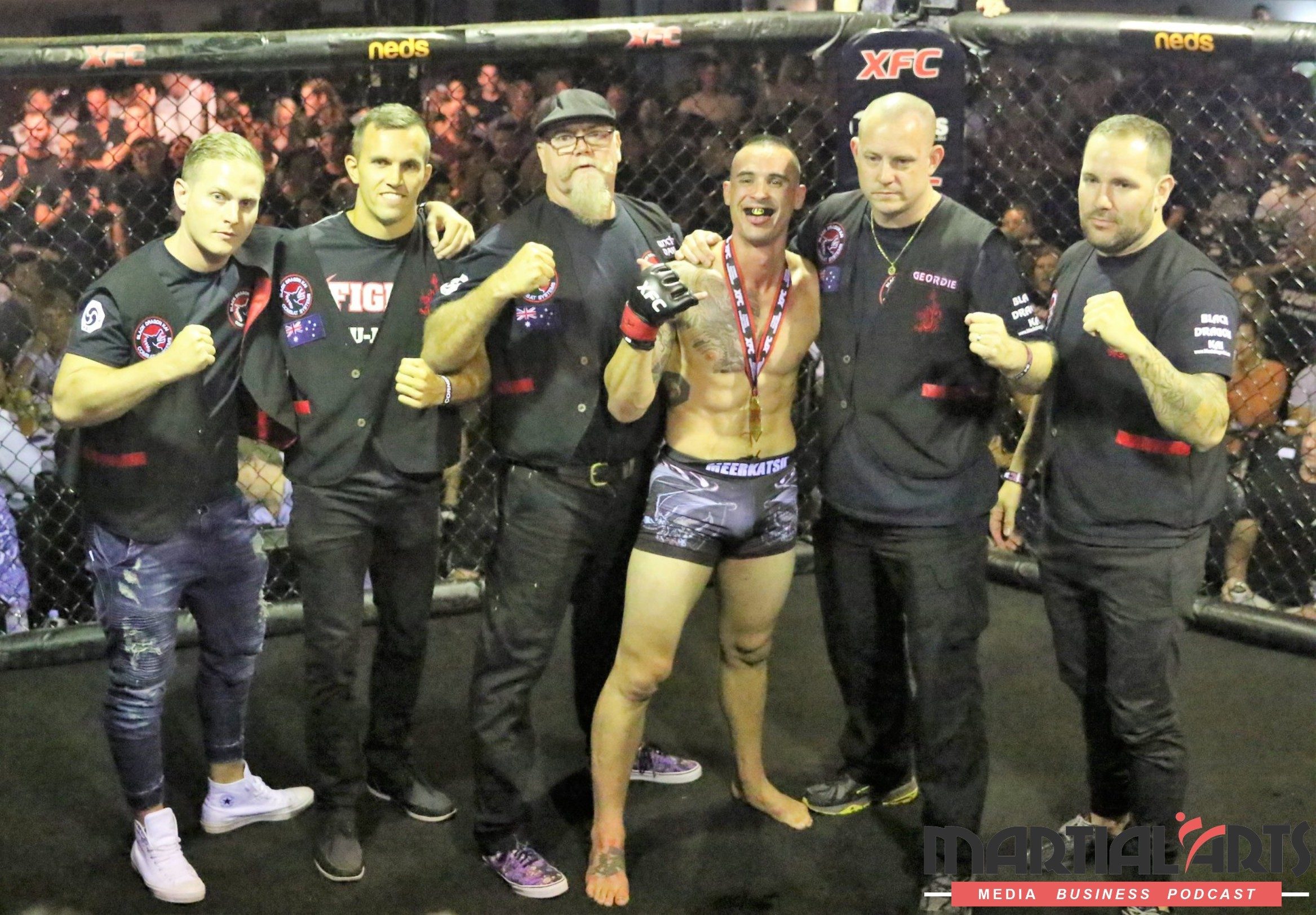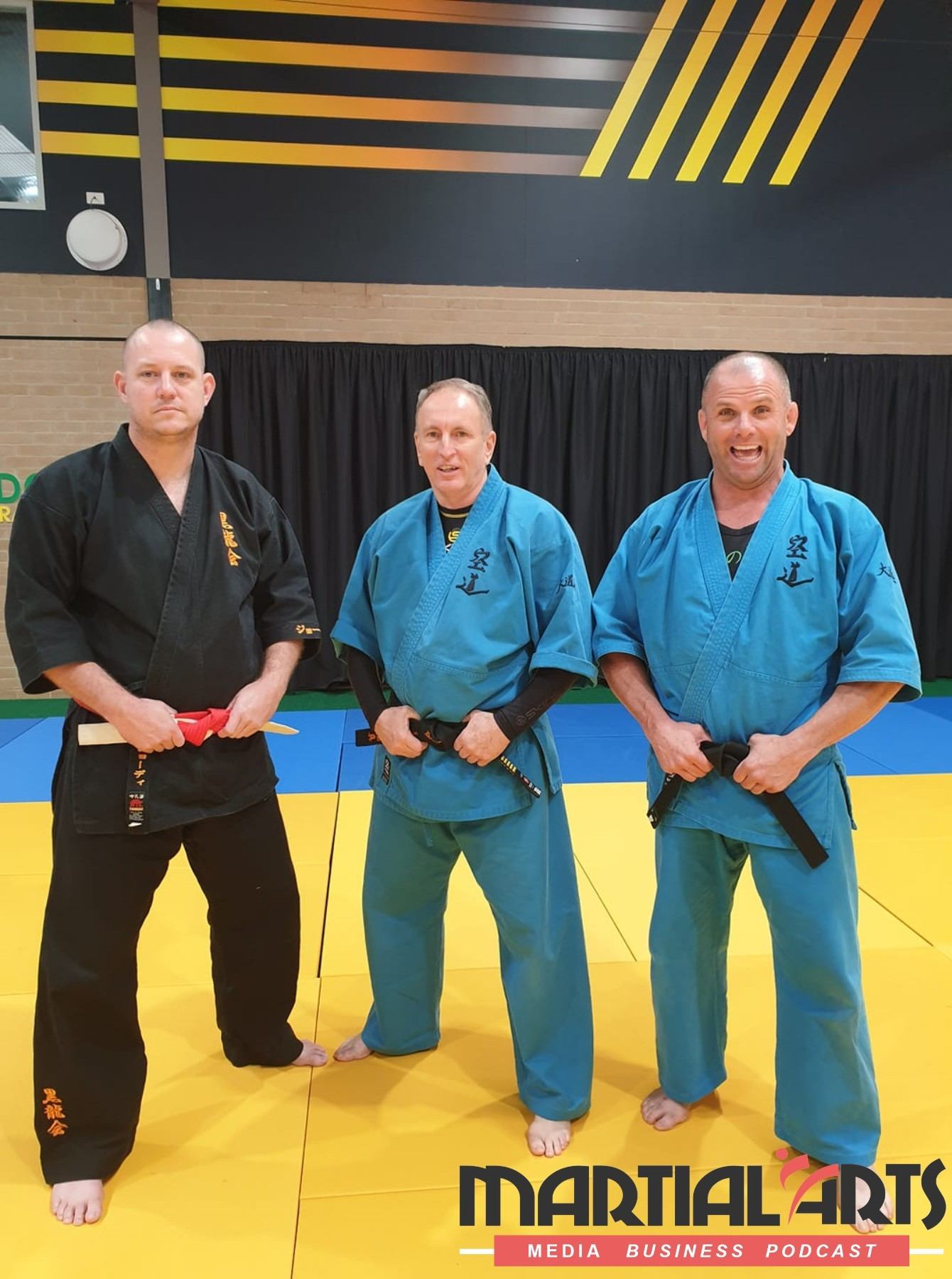Dave Friedman takes a unique approach for sharing his passion for running Krav Maga based self-defence courses for corporates.
- What is personal safety really
- About Live Safe Education, which aims to teach a spectrum of self-protection strategies to schools, companies, and businesses
- How not to be more vulnerable or prone to becoming a victim of a crime
- The advantages of learning self-defence and self-protection techniques in the workforce
- And more
*Need help growing your martial arts school? Learn More Here.
TRANSCRIPTION
No matter how good you are, no matter what degree of black belt or dan you might be in your martial arts, if in the moment you freeze, and you're unable to physically act, it doesn't matter how good you are.
GEORGE: Good day, this is George Fourie, and welcome to another Martial Arts Media business podcast. Today, I am joined with Dave Friedman.
Dave Friedman, he's going to do the official, good intro, but he's from Krav Maga Australia, and something we're also going to talk about today is Live Safe, which is their company based on personal safety, and working with corporates and schools. Welcome to the call, Dave.
DAVE: Thanks, George. We appreciate you having me on.
GEORGE: Yeah, cool. This is the first time I actually have a South African guest on the podcast, other than myself, which is pretty cool.
DAVE: So now there are two accents that people won't understand.
GEORGE: Two accents, and I mean, we're not as good as the Kiwis, because apparently we're second best in the world. I don't know how that stat works. And I don't know why the Kiwis got it. It's not like they already have the All Blacks, you know? They have the All Blacks and now they've got the best accent as well. But anyway.
DAVE: That's right.
GEORGE: Yes, so I hope you can decipher the two accents. Well, I guess you're used to one, so now you've got two. Awesome, Dave. Thanks for being on.
I guess, just to kick off, if you can give sort of a bit of a background, just I guess also your background, all the way from South Africa; how you ended up in Australia, and then what you do in the martial arts space.
DAVE: Sure. I'm from Cape Town in South Africa, which is the good part of South Africa. I grew up doing judo as a kid, I represented my province, which is the equivalent of my state, up until about the age of 10. I then actually took quite a break from martial arts. I focused on soccer, I played soccer at quite a high level. And about the age of 18, 19, I got back into martial arts through Muay Thai and through Krav Maga.
So I trained quite a lot of Muay Thai, I competed in a few tournaments in South Africa, in Cape Town. At the same time, I was also training Krav Maga. I've been teaching Krav Maga since 1997, so 22, 23 years now, more so on the side. It wasn't my main, professional form of income, up until about a year ago.

I moved from Cape Town to Melbourne in 2008 with my wife. Most reasons, obviously just crime was on the up in South Africa. Also, more so for education, in terms of starting a family and just wanting my kids to be in a better education system. I've now got two boys, both born in Australia; a nine year old, and a six and a half year old. They both train at my Krav Maga school with me as well. So the bigger they get, the more nervous I get.
And yeah, so been in Australia, now teaching Krav Maga full time. And as mentioned, we've got two companies. Our first company is called Live Safe Education, and that does most of our work in schools and in corporate or businesses, where we teach a spectrum of self-protection, or personal safety, not just self-defense. And then Live Safe Education also owns a Krav Maga Dojo called Krav Maga Australia.
There, we have about 120 students currently, growing. We've owned Krav Maga Australia for seven months, and we've doubled the student base in that time. So we've gone from 70, from about 65 to 120 in seven months and still growing, which is great. We run kids and adult classes there, 11 sessions a week. And then during the workday, we focus on the schools and the corporates under the Live Safe banner.
GEORGE: All right, awesome. So I'm going to backtrack here, and I might have spoken a bit about this, but because … and we've got listeners from the United States, from New Zealand, a lot in Australia as well. Give a bit of context. I mean, it's always good for me to say Australia is great, but for different reasons that other people might see. And I think when people live here, it's easy to complain about minor things. Whereas when you come from a different perspective, you see things with different eyes.
DAVE: Sure.
GEORGE: What is your take? How different is it for you living in Australia versus South Africa?
DAVE: Look very, different. In South Africa, I think the difference being in South Africa, crime is literally or can be around the corner at any time. Whether you're at home, whether you're out having a coffee, or having a meal, walking in the street. There is a 24/7 concern of crime, and therefore, the average person growing up in South Africa, you have this 24/7 always a level of concern.
If you talk about Cooper's Color Code of Situational Awareness, he was a sergeant in the American army which came up with these color codes. He speaks about code white, yellow, red and black. Code white being where you're just oblivious, your situational awareness is almost at zero, and you're unaware of what's happening around you. And that's how many Australians live, because thankfully, we can afford to live like that. And that's one reason why we live here.
In South Africa, everybody is constantly in a code yellow at least, and code red at certain times. So you're never fully relaxed. You're always aware that, at any time, something could happen. When you stop at a red traffic light, you're looking for someone coming to carjack you. When you're getting out your car, you park in a spot, you first look up, you make sure there's no one close by, and then you get out of your car. Every part of your life in South Africa is governed by the constant threat of crime.
Although the concern or worry about crime in Australia is on the up at the moment, it's still nowhere near the levels of South Africa. Unfortunately … well not fortunately or unfortunately, but your average Australian is more often than not in that code white in terms of the level of situational awareness, which makes them more vulnerable, or prone to becoming a victim of crime, whether it be a very low level crime, like a mugging, or having something stolen, or something more severe.

Whereas what we do at Live Safe is just try and give people some very basic strategies and techniques, without affecting their daily life, but just where they can be close to that code yellow, particularly in transitional spaces, where they are more prone to becoming a victim of crime, in order to keep themselves safe from both the physical, but also the psychological aspects of becoming a victim of crime.
GEORGE: Yeah, cool. So we will definitely dive a bit deeper into that, but I was speaking to one of my friends the other day, and now if you bring this up, it's sort of … and I don't know if I'm accurate in saying it this way, but something when you grow up in South Africa and you're talking about the situational awareness, it is a different thing. I know it took me a couple of years to really drop my guard, until they broke into our house at the end of last year.
Now that situational awareness is right back where it was, but it's a different type of way of life. As you say, you're always assessing, you're always judging, you're always looking why you're standing there, why are you doing this? What's your intention? You're always trying to summarize a situation. And something that, when I grew up in South Africa, you'd never hear of things like you hear in Australia, like the king-hit. You know, where people get punched and they just … they die.
I've always thought about that, like is that just because, well, I mean, I'm used to just the report they live off crime, which also is a whole another story. But partly, the discussion came about, is it that when you grow up in a situational … like in a country where crime is not that on the forefront, that a king-hit catches you off-guard that you actually stumble down and die, whereas when people are more aware of their situation, it's less likely to happen. What are your thoughts on that, Dave?
DAVE: Great. No, I think again, In South Africa, because you … and again, one reason why we left there is because you have this natural level of aggression, concern, suspicion, and that's your base norm to anybody you meet or see, almost until proven otherwise.
Where I think in Australia, your base norm is that everyone's a good mate and a good bloke, and just wants to have a drink with you, and therefore, the person who is on that extra level of aggression, whether it be mental health, personality, drug-induced, or alcohol-induced … it isn't the assumed position. So yes, you're walking out of a club and you bump shoulders with somebody, in South Africa, you actually both turn around and you kind of make sure that there's no escalation, and then you turn and leave.
Here, you don't think about it. You keep leaving, and the next thing, if the person you bumped into turns around, and just king-hits you from behind, and you're taken completely by surprise, because the average Australian doesn't think that that's actually a possibility to happen. So they're not aware of it, so they're not taking that extra step to maybe just look over their shoulder, and just look at the reaction of the person you bumped into, as innocent as it may be, before actually determining that, “Yes, there's no concern. Yeah, I could carry on walking.”
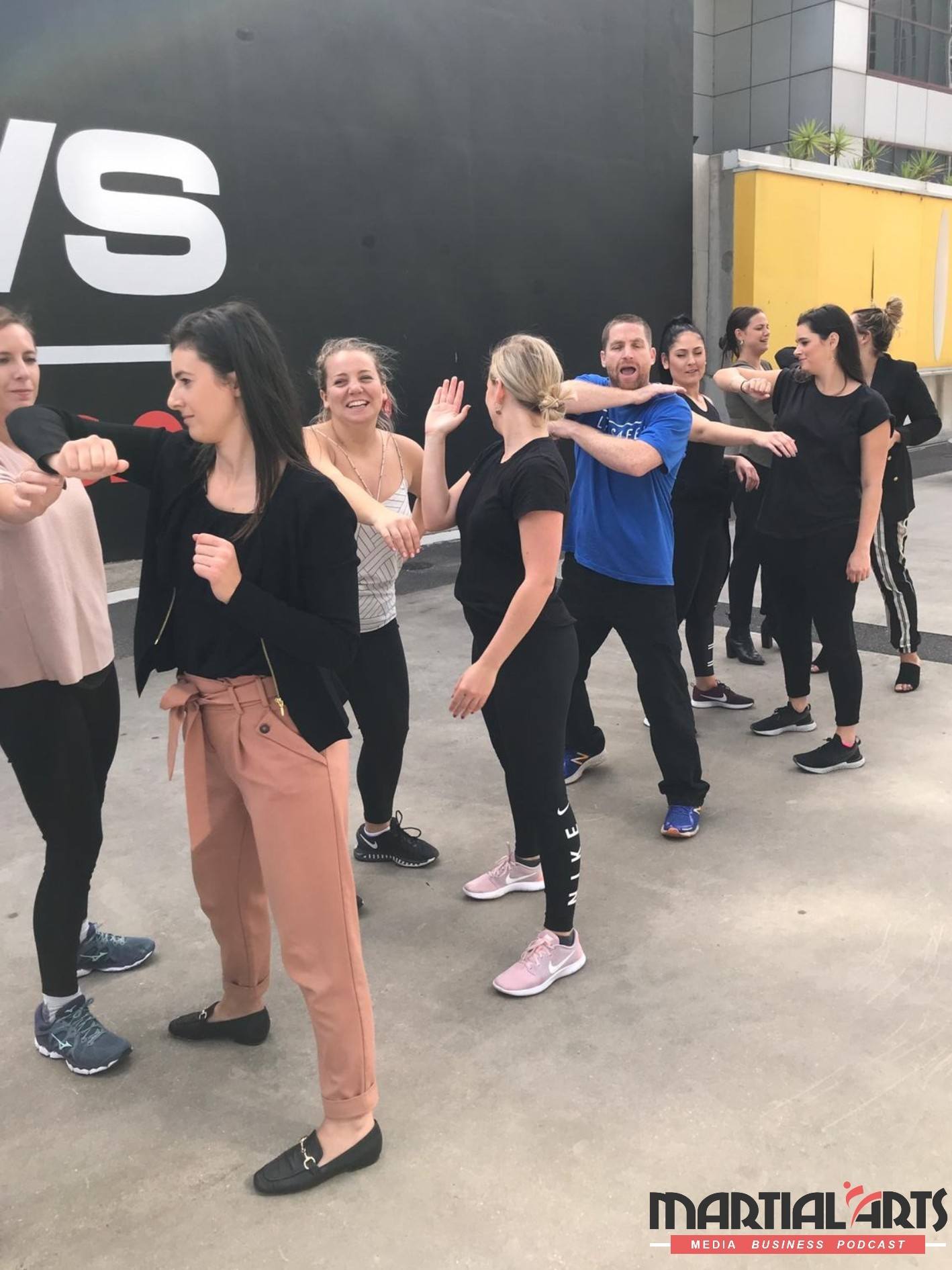
It's small things like that. We're not saying you need big, impactful things to your life, but if you do bump into someone by mistake, just look over your shoulder, have a half a second look. Even if you smile, put your hand up and go, “Sorry, mate.” It doesn't affect your life, but it just gives you that ability to make a quick analysis, “Is there something going escalate here that I need to maybe take some sort of preventative action, or can I just carry on?” It's half a second, but it can make a big difference, as you've as you mentioned.
GEORGE: Yeah. That's awesome. Well, let's dive a bit more into something you mentioned before we spoke, which I found kind of fascinating, as in the differentiation in the definition of what you do. Where most people approaching corporates go the self-defense aspect, and they promote their-
DAVE: It's correct.
GEORGE: …as self-defense. You've chosen to go the opposite, which is personal safety. What's the reason behind that?
DAVE: Right. So number one, again, obviously just with my background, growing up was Africa and having these natural intuitions. What I never said earlier is that when I was working professionally before teaching Krav Maga, I was in the security environment, and particularly sort of high-level counter-terrorism security. Again, even when you're consulting on counter-terrorism, you're not consulting on what to do when there's a gunman inside your venue, you want to know what can you do to prevent the gunman getting into your venue in the first place.
I say, “Avoidance and prevention, which is much better than the cure.” So I take that, my learnings, that analogy from counter-terrorism, combine it with my self-defense skills, and now I teach what we call personal safety. So we've come up with what we call the Live Safe model of personal safety, which talks about avoidance, prevention, effective escape.
That's what we teach people, so it's not just about self-defense. Yes, we need to learn how to punch and kick and defend ourselves from being held or grabbed or whatever, but we never ever want to use it. On one hand, I strongly believe in learning self-defense, because the confidence you gain from learning self-defense is very often enough to ensure that you don't become a victim of crime, because knowing you can defend yourself, you actually portray this aura of confidence that doesn't make you an easy victim.
But even before that, we want to talk about avoidance and prevention, so that we never have to even think about self-defense in the first place. So I can zoom in on each of those quickly.
GEORGE: Yeah, please.
DAVE: We talk about avoidance. So avoidance, we talk about making safe decisions in the first place. That can be something as simple as you're getting ready to leave the work day, it's 16:35, 17:30, sun's down. You've got a 20 minute walk to the train station, it's dark. Before you leave work, just lift your head up and ask your colleagues, is anybody else leaving in the next few minutes? If someone leaving in two, three minutes, hang back, take the three minutes, walk together in a group. It's just safer than walking by yourself.
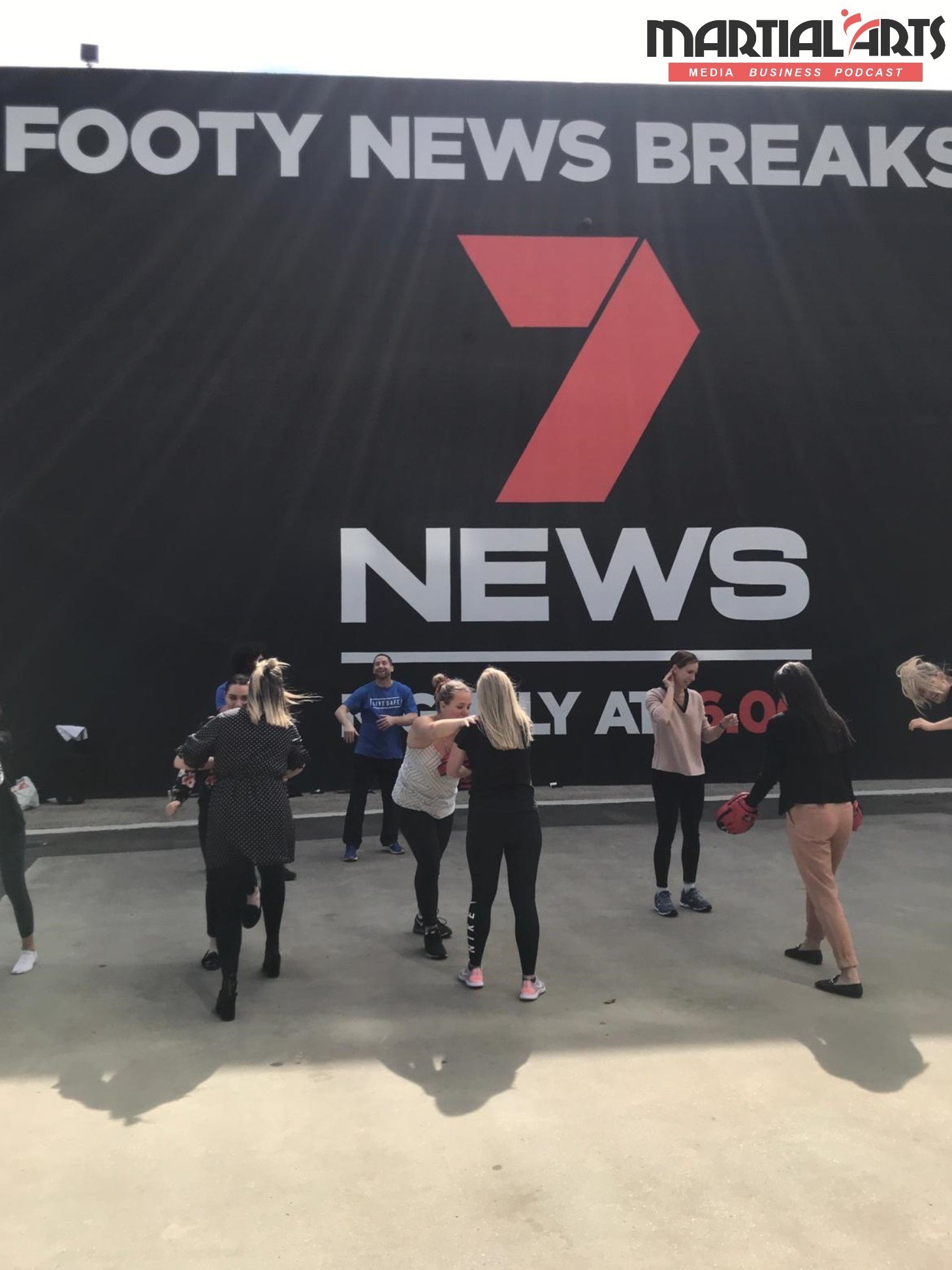
You're going for an exercise, run or a walk in the mornings or evenings when it's dark. You have an option between a dark, unpopulated park, or a well-lit populated streets, take the well-lit populated streets. It might not seem like the best choice at that time, because you're late, you're urgent, we've all got to rush somewhere, the three minutes through the park is quicker at the time, but it's not the safe decision.
So in safe decision, we talk about avoid potentially dangerous environments altogether. Stay in a group, stay in well-lit areas, no matter what might seem pressing at that time. And the way I talk about it is always think of the two extremes of either choice.
Now hopefully, you never come to any extreme, but if the extreme is something happens to me, the park and instead of being five minutes late, I'm in hospital, versus staying in a populated area and I'm 15 minutes late, nevermind five minutes late … which of those two consequences would I prefer to deal with afterwards? And I would hope to think that being 15 minutes late is an easier consequence to deal with than being a hospital. And as I said, dealing with not only the physical, but also the psychological aspects of being involved in a crime. So that's where we talk about avoidance, making a safe decision to avoid an unsafe or a potentially dangerous situation altogether.
Under prevention, we talk about, if you can't avoid an environment altogether, at least have increased situational awareness that will allow you to make an early decision. And that can be simple things, again, these things don't have to impact your life. It can be just listening to gut-feel. So you are walking down the street, you see three, four guys walking towards you. Maybe you can see by body language, you can see they're maybe a bit intoxicated or affected by drugs, alcohol, mental illness, whatever it is. You just get that intuition, “Something doesn't feel, I don't feel safe.”
Why walk past them with a sense of saying, “Oh, I hope they don't hurt me.” Just cross the road, walk into a shop. Let them walk past you. Just make a safe decision, or an early decision to avoid becoming a victim of crime within an environment you can't necessarily avoid altogether. But you cannot make an early decision without situational awareness. And obviously, the biggest killer to date of situational awareness is our smartphones. When we walk and looking at our phones, we need to understand that we have zero to no situational awareness at that stage, and we are more prone to becoming a victim of crime. I'm going to talk about this further. I can talk a lot about this.
GEORGE: Yeah, man. It's great, and yeah, so the last one, effective escape.
DAVE: Yeah, that's great.
GEORGE: That's correct, yeah?
DAVE: And then effective escape means that if I'm either about to be or in a situation where I have become a victim of crime, then it's about an effective escape. And that word effective escape is very important, because if I'm by myself and I back my martial arts … never when I'm by myself, I'm pretty fit and active. I know that if someone's trying to attack me, maybe I can give them one kick or one punch. I can slow them down for a few seconds, and I can turn and run and get to safety.
But if I'm with my six year old kid, I can't run so fast. So maybe one little kick and running away, what am I going to do? Leave my six year old kid behind? My mother-in-law? Maybe we can discuss that, but my six year old kid? No. And I make that joke, my mother-in-law's listening. It's just a joke.
GEORGE: Love you, mother-in-law.
DAVE: If you're with your wife, if you're with your partner, if you're with your mother, if you're with your kids, you can't run so fast. The last thing you want to do is pick up your kid and run, but being chased now, and be caught by a potential criminal, three, four, 5 minutes later, when you're exhausted, and now you can't fight, and now you've got to deal with a fight.
That might take maybe one, two strikes, three strikes, four strikes. It might be putting him on the ground and sit on him until the police arrive, until backup arrives to assist you. But that is your effective escape, because running may not be an option for you, depending on your environment, who you're with, how far you are from a safe venue.
Escape has a whole range itself. It could be a distraction technique, it could be throwing something behind them and you running in one direction, because you're by yourself and you're a good runner. But it could be full strikes and techniques and everything else to go to full restraints on the ground, because there is no other effective way to escape. So an effective escape is a really important aspect of that.
GEORGE: Love it. That's awesome. Cool, Dave. A couple of questions, just steering towards our business owner listeners over here. So Live Safe, now, I really like how you define the personal safety aspect. What is typically your foot in the door with corporates, and how do you go about approaching them?
Thank you. Yeah. Thankfully, a lot of corporates are now coming to us, which is obviously great. What's interesting is they come to us for one of two reasons, either because they have decided there's a need for increased staff-wellness, and more and more so, staff wellbeing and staff-wellness is becoming a bigger priority for companies, and that's obviously good for us. That involves both companies assisting their staff with mental wellness, as well as physical wellness, and one impacts the other. We can talk about that as well.
So sometimes, it's a company that says, “We want to do this for our staff.” Whether it be as a general concept, and might be … We did a session last week as the company was having a staff-wellness week. As part of their staff-wellness week, they brought us in for one session, along with whatever other activities they did for their staff in that week. We did a session for the Sussan Group, which is quite a big retail clothing group, with the head office in Melbourne. And there, that actually came to us because their staff are 97% female, and their staff approached the manager of HR saying, “We don't feel safe walking to or from work. Is there something the company can do for us, or facilitate us doing some sort of training?”
DAVE: The company then researched a number of self-defense companies. They came across us, and again, they phoned a number of companies, but we're the only company they actually brought in for an interview, and ultimately got the work, purely based on the fact that we're the only company that spoke about the overall model of personal safety, and not just self-defense.
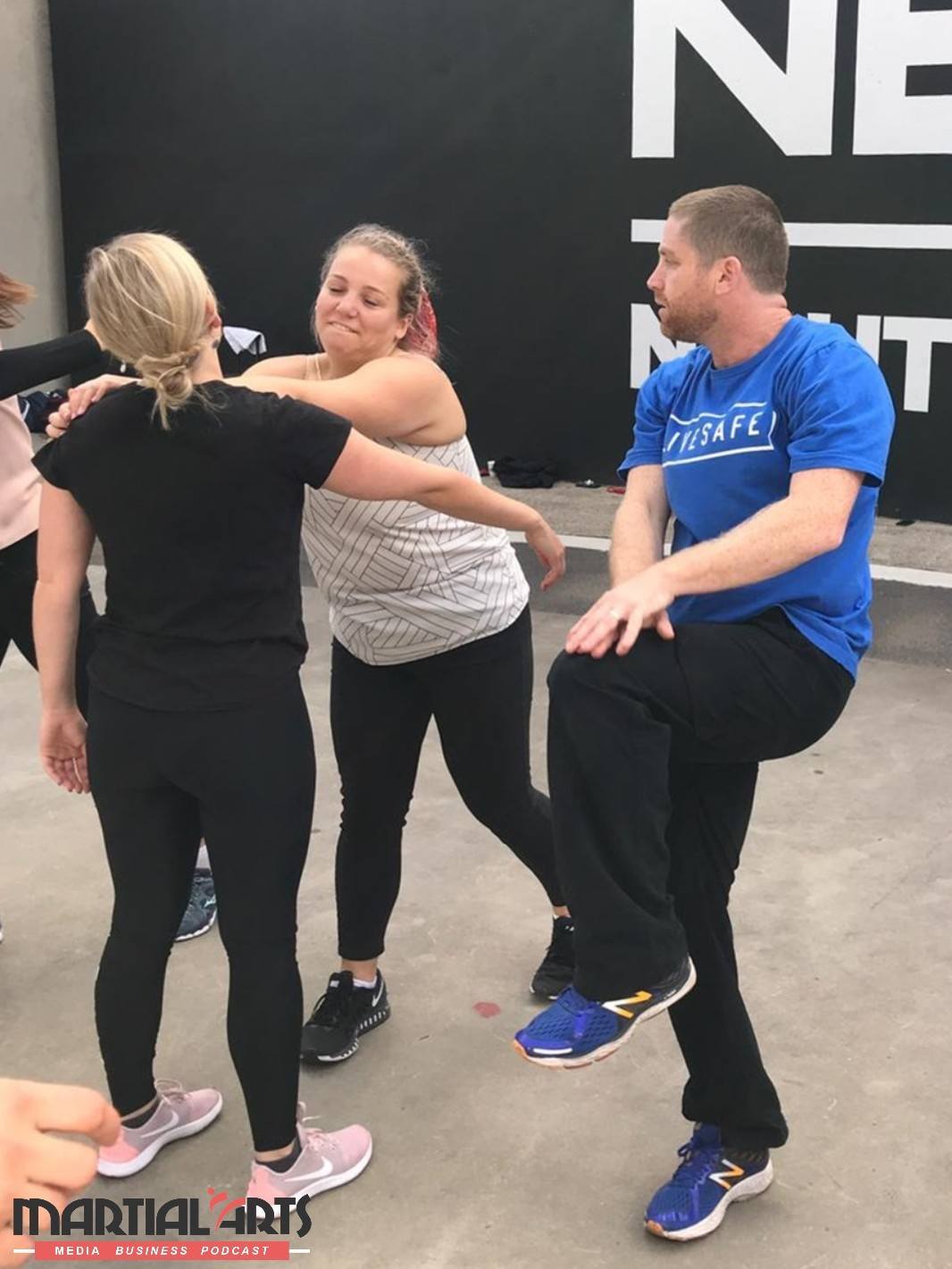
I think that's really important, that's what companies want. They don't just want to know that their staff can punch and kick, but they want to know that their staff can avoid becoming victims of crime through non-physical strategies and techniques that they can implement, and obviously, it has a range of benefits to staff members: confidence, empowerment, physical confidence, also helps with mental wellbeing, and mental confidence. It comes with loyalty to companies, staff know the companies are looking out for them, that they build loyalty amongst their staff members. And certainly, it has, even though it's not primary, it has a really good team building aspect.
When you have a number of staff from different divisions, different levels of seniority, all doing something for the first time, I'd know who's who, I'd know who's the janitor, or who's the CEO. I'd see the faces in front of me, and suddenly, they're all doing something at the same time, our sessions are very fun. If you look at some of our videos, there's always laughter and they're enjoying it. It's serious, but we learn it in a fun way to make sure that our participants enjoy being there.
Obviously, if you enjoy doing something, you're always more open to learning more of it. And we get a lot of positive feedback about how our sessions help increase general team building, staff engagement among staff that maybe work inside the different divisions, or departments that don't ordinarily talk to each. But suddenly now in the coffee room, they have something common to talk about and laugh about the next day or the next week. So that's kind of a side benefit for our clients as well.
GEORGE: That's awesome, because you're touching with some of the aspects there. I guess it comes down to the whole sell them what they want and give them what they need. Because most people … in my mind, because we do a lot of Facebook marketing for schools and just general marketings, and campaigns and copy, and it's like different exercises and things. We've got a group we call Partners, which is a group of school owners I work with, and we always sort of testing different ideas and things. You're talking, I'm like, in my mind, I'm thinking of different approaches that really go well, but I mean, I think the typical approach for a school owner would always be, can your staff defend yourself? Can they defend themselves?
But let's face it; that brings up a lot of resistance in a lot of people, because, “Ah, I don't want to fight. I don't want to punch people. I don't want to …” That it could be that whole mindset, that whole frame of thinking. Whereas, does your staff feel safe walking home at night? … is a whole completely different story. How you would combat that is the same avenue, but how you defined it is just, sets a whole different tone.
DAVE: Good, absolutely. And again, what we do, and I mentioned the example of walking down the street and just seeing a group of people that make you feel uneasy, and you walk into a shop across the road. Or asking some staff members before you leave, “Is anybody leaving soon?” These are very simple, basic things which they don't affect or significantly affect your life in any way. You said it to people, and you can kind of see the bells going off at the top of their head going, “But that's so simple.” But it is simple. And security doesn't have to be rocket science, or personal safety isn't rocket science. It's just a matter of having someone put it in your head, and these are things that can be very easily implemented.
I talked a lot about, obviously Melbourne, there's a lot of trams, and there's a number of incidents across Melbourne where people get attacked or sexually abused or whatever, on trams, because very often, you're on tram with a group of people, and if you towards the end of the tram stops, very often there's women who are situation where they're one-on-one on a tram with one other passenger. And if you read all the case studies again, all the time they say, “Yes, the passenger, he made me feel uneasy.
It was the way he was looking at me, or maybe I could see he had mental health issues. The way he was talking to himself or shouting or swearing, or even getting angry and engaging the other passengers.” So then as the tram's getting emptier and emptier and emptier, again, if your head's not buried in your phone, but you have the situational awareness of going, “I can see that he's … not is, but potentially, or has the potential to become a problem.” Don't wait for a problem to manifest itself.
But if you can see that the potential is there for it to maybe, and definitely not, but may become a problem going forward, don't put yourself in a situation where either something may happen. Or even if it doesn't, if you feel vulnerable, no one deserves that, that feeling of vulnerability. So as people are getting off the tram, make an early decision. Whereas getting down to just three or four of you left on the tram, get off early. It doesn't matter if it's three, four, five stops prior to your stop. Don't be in a situation where you're one-on-one on that tram, just in case you are that 0.000001% of the person who might be attacked or abused. Now, to you, it's another percentage, but tell anybody who is that 0.000001%, how they feel, and it's their 100%.
So get off the tram early, wait for the next tram. Be 15 minutes late, take an Uber, spend an extra 10 or 15, $20, whatever it is. But it's an early safe decision to make, to avoid a situation. Even if it's not guaranteed, but potential, why be there? Why have even the possibility of becoming violent? Get off two stops early, three stops early. Find another way home. There's enough options out there for you. It's just having that situational awareness of being able to …
I call it Analyze, Evaluate and Act. Analyze your environment, analyze the situation, analyze what's happening in front of you. Make an evaluation, threat or no threat. Danger or no danger. Danger, potential danger or no danger. And once you've made that evaluation, then act upon that, and make the safe, responsible early decision under that and act. So we're talking about Analyze, Evaluate and Act.
GEORGE: Awesome, love it. So just quickly, before we start sort of wrapping it up, if you had advice for any school owners that would think, all right, they want to start running self-defense-type programs for different corporates in their area, how would you go about starting the whole journey?
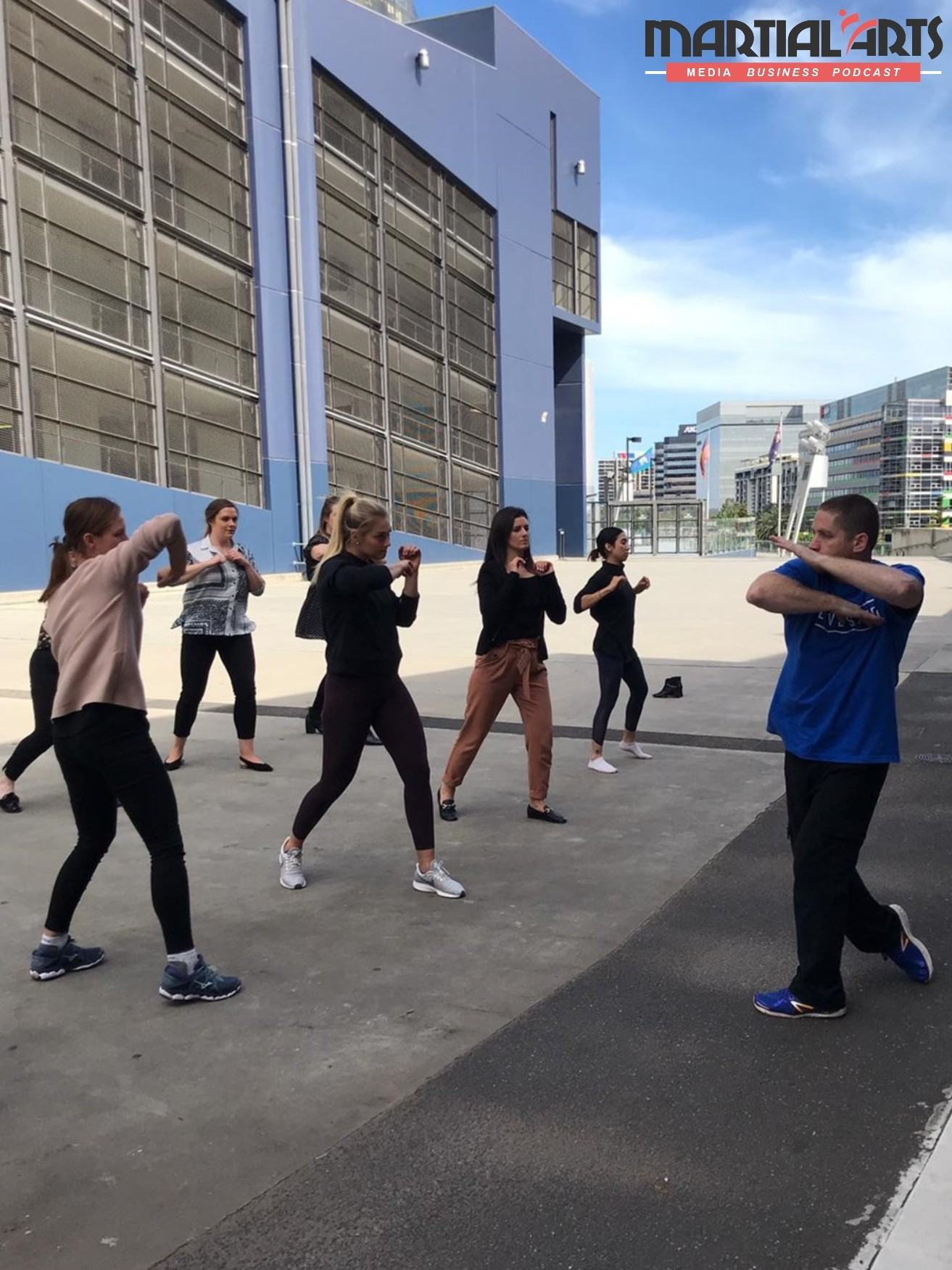
DAVE: I think similar to what we do at Live Safe, and obviously, our actual self-defense teaching is around the Krav Maga model, and through our Krav Maga Australia School. But don't just think of your striking, your punches, your kicks, even your releases from chokes, your holds and that kind of stuff as personal safety. That's an aspect of it. But also think of everything around it and what value-add you can give to people, almost un-sell your own product.
Say, “I want to teach you self-defense, or I can teach you self-defense, but more importantly, I want to teach you how to never have to use self-defense in the first place.” Because if you're involved in a fight, somebody's going to lose. Somebody gets hurt, it's as simple as that. In a fight, somebody gets hurt. You just hope it's the other person, less so than you. And even if you win the fight, you might still get hurt. And there's still psychological effects after that as well.
It's a matter of what can we do beforehand to avoid ever having to be in a fight, but also, what can we do afterwards? You know that effective escape means running to safety, well, how do you define what is a safe place to run to? Or why are you walking? Are you constantly assessing what is the nearest safe place for you? Is it an open shop? Is it your house or a friend's house that might be nearby?
If something were to happen now, where would you run? So there's this thinking in the moment, the more you can just have it sort of front of mind, or just in our subconscious, generally the less thinking there is. And we all know, when the actual event happens, and the adrenaline dump hits, and the stress level is increased, and the heart rate increases, our ability to think and make judgment calls becomes harder and harder.
So the more we plan for these and prepare for these, the easier we are to make a safe and responsible decision in the moment. But it's also about avoiding that moment. And also again, when we focused on, and both very much in our Krav Maga Australia the school, whenever we teach techniques, we don't only talk about the physical aspects of the street fights, but we also talk about the psychological aspects of the street fight.
So as owners, do your research. What happens to the body when you experience an adrenaline dump? What are the effects that you have? Things like the elevated heart rate, the tunnel vision, auditory exclusion, the time slowing down, et cetera. What actually happens to the person, and how can we train to counteract those things?
It doesn't matter how good you are at any martial art. People ask me, “What's the best martial art in the world?” I'll say, “Whichever one you train the most.” It's simple, whichever one you train the most, whichever is your muscle memory and go-to, that's the best martial art. It's simple as that. But no matter how good you are, no matter what degree of black belt or dan you might be in any martial arts, if in the moment you freeze and you're unable to physically act, it doesn't matter how good you are.
So we also have to train the psychological aspect of not … making sure we don't go into that freeze mode, and we are in the fight mode, that we can fight. It might be a psychological fight or a mental fight, but we have to train our students in how to realistically understand and cope with what might happen to them in a street fight, in terms of them talking about their personal safety when they're not inside the gym. And therefore, so that they can deal with the psychological aspect in order to enable their physical training to actually be useful in that moment.
And that, to me, is a lot of surprise drills, high-heart elevation drills, et cetera. We do a lot of work, we'll train techniques in our gym, for example, we might train a technique on a choke release, whether it be someone's got one hand or two hands around your neck and they're choking you. We'd go through the technique, we'd train it, slowly. Then we train it at a bit more of a faster pace, and then we'll always do a surprise exercise. So eyes closed, and you don't quite know exactly when that choke's going to come on.
Or we make them turn the lights off in the dojo, we make our students just walk around the dojo with 10, 15, 20 other people on the mats, and at some point, one of them suddenly going to just put the choke on them. It's a matter of trying to deal with the element of surprise and how quick they can go through that, Analyze, Evaluate and Act loop, to get to action, have a good, quick reaction and get out of it before they get into that freeze mode.
GEORGE: All right. Dave, that was really good. That was really helpful. You've got such a lot of cool little one-liners as snippets from this, from this interview. If somebody wants to hire you or perhaps get your advice on this, how can people get a hold of you? And how should they get in touch?
DAVE: All right, thanks, George. Yes, we do have the two websites, so for Live Safe, the website is livesafe.org.au. And for the Krav Maga Australia, it's kravmagaoz, K-R-A-V-M-A-G-A-O-Z.com.au are the two different websites, or on my phone number, 0424 184 618.
And again, as you say, it'd be nice if anybody wants to sort of hire us as a client, but again, unfortunately, my passion for teaching personal safety outweighs my passion for business. I'm more than happy to offer any advice, any tips that I have, both to other school owners or just to members of the public. Don't be shy, give me a call. I'm more than happy to offer whatever knowledge and assistance in whatever way I'm able to add value. I'm more than happy to.
GEORGE: That's awesome. Yeah, and if you're listening and you got great value out of this and it's spearheading perhaps a portion of your business that you've been trying to get going, yeah, do just reach out to Dave, even if it's just to say, “Hey, thanks. Thanks for the tips.” And yeah, that'd be great. Awesome. Dave, thanks again for being on.
DAVE: George, appreciate you having me.
GEORGE: Yeah, you're welcome.
DAVE: Thanks, George, appreciate it.
GEORGE: Yeah, and good to have a similar sounding accent on board.
DAVE: Yeah, absolutely. I've got-
GEORGE: It means a lot.
DAVE: I could be at home.
GEORGE: Exactly. Awesome. Speak soon.
DAVE: Great. Thanks, George.
Awesome. Thanks for listening. If you want to connect with another top, smart martial arts school owners, and have a chat about marketing, lead generation, what's working now, or just have a gentle rant about things that are happening in the industry, then I want to invite you to join our Facebook group.
It's a private Facebook group and in there, I share a lot of extra videos and downloads and worksheets – the things that are working for us when we help school owners grow and share a couple of video interviews and a bunch of cool extra resources.
So it's called the Martial Arts Media Business Community and an easy way to access it is, if you just go to the domain named martialartsmedia.group, so martialaartsmedia.group, g-r-o-u-p, there's no .Com or anything, martialartsmedia.group. That will take you straight there. Request to join and I will accept your invitation.
Thanks – I'll speak to you on the next episode – cheers!
Here are 3 ways we can help scale your school right now.
1. Join the Martial Arts Media community.
It's our new Facebook community where martial arts school owners get to ask questions about online marketing and get access to training videos that we don't share elsewhere – Click Here.
2. Join the Martial Arts Media Academy and become a Case Study.
I'm working closely with a group of martial arts school owners this month. If you'd like to work with me to help you grow your martial arts school, message me with the word ‘Case Study'.
3. Work with me and my team privately.
If you would like to work with me and my team to scale your school to the next level, then message me with the word ‘private'… tell me a little about your business and what you would like to work on together and I'll get you all the details.
Enjoyed the show? Get more martial arts business tips when you subscribe on iTunes for iPhone or Stitcher Radio for Android devices.
***NEW*** Now available on Spotify!
Podcast Sponsored by Martial Arts Media Partners


